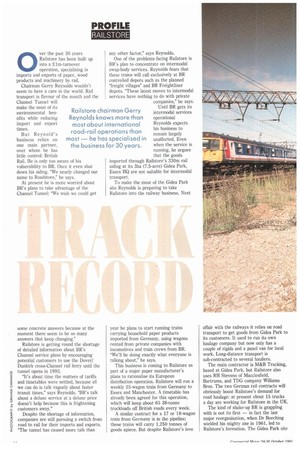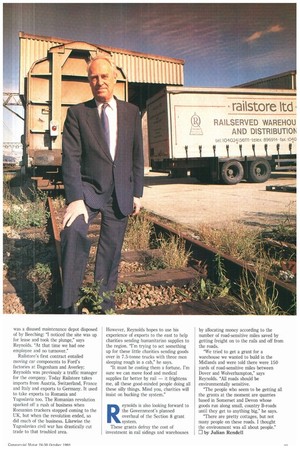0 ver the past 30 years Railstore has been built
Page 38

Page 39

If you've noticed an error in this article please click here to report it so we can fix it.
up into a Z1m-turnover operation, specialising in imports and exports of paper, wood products and machinery by rail.
Chairman Gerry Reynolds wouldn't seem to have a care in the world. Rail transport is flavour of the month and the Channel Tunnel will make the most of its environmental benefits while reducing import and export times.
But Reynolds business relies on one main partner, over whom he has little control: British Rail. He is only too aware of his vulnerability to BR. Once it even shut down his siding. "We nearly changed our name to Roadstore," he says.
At present he is more worried about BR's plans to take advantage of the Channel Tunnel: "We wish we could get some concrete answers because at the moment there seem to be so many answers that keep changing."
Railstore is getting round the shortage of detailed information about BR's Chunnel service plans by encouraging potential customers to use the Dover/ Dunkirk cross-Channel rail ferry until the tunnel opens in 1993.
It's about time the matters of tariffs and timetables were settled, because all we can do is talk vaguely about faster transit times," says Reynolds. "BR's talk about a deluxe service at a deluxe price doesn't help because this is frightening customers away."
Despite the shortage of information, companies are still pursuing a switch from road to rail for their imports and exports. "The tunnel has caused more talk than any other factor," says Reynolds.
One of the problems facing Railstore is BR's plan to concentrate on intermodal swap-body services. Reynolds fears that these trains will call exclusively at BR controlled depots such as the planned "freight villages" and BR Freightliner depots. "These latest moves to intermodal services have nothing to do with private companies," he says.
Until BR gets its intermodal services operational Reynolds expects his business to remain largely unaffected. Even when the service is running, he argues that the goods imported through Railstore's 330m rail siding at its 3ha (7.5-acre) Gidea Park, Essex HQ are not suitable for intermodal transport.
To make the most of the Gidea Park site Reynolds is preparing to take Railstore into the railway business. Next year he plans to start running trains carrying household paper products imported from Germany, using wagons rented from private companies with locomotives and train crews from BR. "We'll be doing exactly what everyone is talking about," he says.
This business is coming to Railstore as part of a major paper manufacturer's plans to rationalise its European distribution operation. Railstore will run a weekly 25-wagon train from Germany to Essex and Manchester. A timetable has already been agreed for this operation, which will keep about 65 38-tonne truckloads off British roads every week.
A similar contract for a 17 or 18-wagon train from Germany is in the pipeline; these trains will carry 1,250 tonnes of goods apiece. But despite Railstore's love affair with the railways it relies on road transport to get goods from Gidea Park to its customers. It used to run its own haulage company but now only has a couple of rigids and a panel van for local work. Long-distance transport is sub-contracted to several hauliers.
The main contractor is M&B Trucking, based at Gidea Park, but Railstore also uses RH Stevens of Macclesfield, Bartrums, and TDG company Williams Bros. The two German rail contracts will obviously boost Railstore's demand for road haulage: at present about 15 trucks a day are working for Railstore in the UK.
The kind of shake-up BR is grappling with is not its first — in fact the last major reorganisation, when Dr Beeching wielded his mighty axe in 1961, led to Railstore's formation. The Gidea Park site was a disused maintenance depot disposed of by Beeching: "I noticed the site was up for lease and took the plunge," says Reynolds. "At that time we had one employee and no turnover."
Railstore's first contract entailed moving car components to Ford's factories at Dagenham and Averley; Reynolds was previously a traffic manager for the company. Today Railstore takes imports from Austria, Switzerland, France and Italy and exports to Germany. It used to take exports to Romania and Yugoslavia too. The Romanian revolution sparked off a rush of business when Romanian truckers stopped coming to the UK, but when the revolution ended, so did much of the business. Likewise the Yugoslavian civil war has drastically cut trade to that troubled area. However, Reynolds hopes to use his experience of exports to the east to help charities sending humanitarian supplies to the region. "I'm trying to set something up for these little charities sending goods over in 7.5-tonne trucks with three men sleeping rough in a cab," he says.
"It must be costing them a fortune. I'm sure we can move food and medical supplies far better by rail — it frightens me, all these good-minded people doing all these silly things. Mind you, charities will insist on bucking the system."
Reynolds is also looking forward to the Government's planned overhaul of the Section 8 grant system.
These grants defray the cost of investment in rail sidings and warehouses by allocating money according to the number of road-sensitive miles saved by getting freight on to the rails and off from the roads.
"We tried to get a grant for a warehouse we wanted to build in the Midlands and were told there were 150 yards of road-sensitive miles between Dover and Wolverhampton," says Reynolds. "All roads should be environmentally sensitive.
"The people who seem to be getting all the grants at the moment are quarries based in Somerset and Devon whose goods run along small, country B-roads until they get to anything big," he says.
"There are pretty cottages, but not many people on these roads. I thought the environment was all about people."
by Julian Rendell




























































































